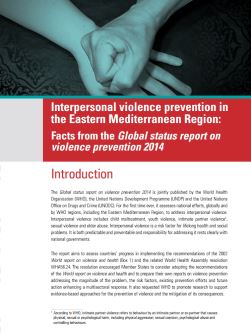The Global status report on violence prevention 2014 is jointly published by the World Health Organization (WHO), the United Nations Development Programme (UNDP) and the United Nations Office on Drugs and Crime (UNODC). For the first time ever, it assesses national efforts, globally and by WHO regions, including the Eastern Mediterranean Region, to address interpersonal violence. Interpersonal violence includes child maltreatment, youth violence, intimate partner violence, sexual violence and elder abuse. Interpersonal violence is a risk factor for lifelong health and social problems. It is both predictable and preventable and responsibility for addressing it rests clearly with national governments.
The findings of the Global status report on violence 2014 offer an opportunity for all violence prevention stakeholders in the Eastern Mediterranean Region to come together and step up their activities and investments to match the burden and severity of the problem in the Region.
For instance, by showing the extent to which national action plans are often not driven by data, the findings provide pointers for governments and regional bodies on how they should steer national planning exercises in a more data-driven direction. By highlighting gaps in prevention programming and service delivery by type of violence, stakeholders at the national, regional and global levels have an opportunity to correct existing imbalances. Perhaps most important, the findings represent a set of indicators and a baseline that will help countries to measure and track future progress based on clearly set targets.



